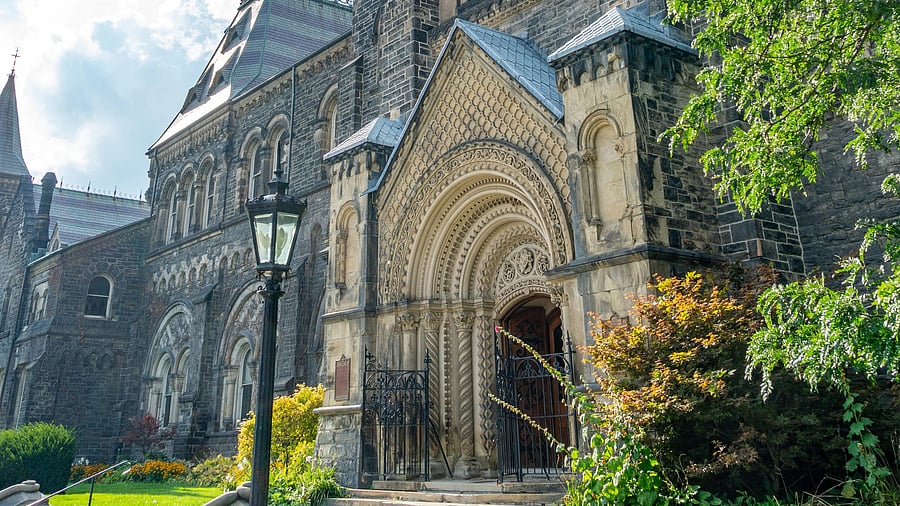
University of Toronto, Canada.
Credit: Special Arrangement
Some overseas education consultants in Bengaluru haven’t received a single university application for Canada this year nor are they promoting it as a study destination. They say visa rejections have surged and processing times have become longer since diplomatic tensions flared in 2023.
According to a global news agency report, 74% of Indian applicants for Canadian study permits were rejected in August 2024, up from about 32% in August 2023. The spike follows a crackdown on fraudulent admission letters. Over 14,000 such applications were detected in 2024, compared to 1,550 in 2023, most originating from India.
However, consultants say they have not come across such cases from Bengaluru and say the problem is largely confined to Punjab and Hyderabad. “Some colleges in Canada have explicitly prohibited applications from Punjab and Telugu states,” says Karthikeyan B S of Knowledge 2 Global Education, Shivajinagar. Likewise, some universities in countries like the UK and New Zealand have barred applications from Punjab, says Uma Aswani of an education consultancy in Dollars Colony.
But "genuine students" who once looked to Canada for IT, engineering, healthcare, and management courses are feeling the heat of this heightened scrutiny, says Karthikeyan. “Study permit approvals have dropped from 60-70% before 2022 to 20-30% in 2023. Earlier, the embassy would do a quick financial verification, but now the process has been outsourced for a detailed vetting of bank and academic documents,” says the head of application and visa services.
Experts say Canada, long favoured for its attractive post-study work options and ease of obtaining the permanent residence (PR) status, is now losing Bengaluru students to Australia, New Zealand, and Europe. While interest in the US has crashed amid its now-tougher stance on foreign students, it hasn’t disappeared entirely.
Added job woes
Binita Parekh, who runs a consultancy on Dickenson Road, has not received a single Canadian application since August 2024. She blames it on “an unstable political climate, emphasis on local hiring, and growing hostility towards foreigners”.
At Study Next Overseas in Jayanagar, visa rejections went up from a dozen in 2024 to over 20 this year despite students writing “perfect SOPs”, says director Rakesh S Malagiti. “We were given just one line for rejection: ‘We don’t believe these students will come back to India’,” he recalls. Though the firm stopped recommending Canada in 2024, enquiries still come from students with relatives there.
A rejected applicant typically loses CAD 235 (approx Rs 14,800) in visa and biometric fees. Karthikeyan adds that visa processing, which typically takes 15 to 30 days, can now stretch up to six months in select cases. Sushma R B, of Overseas Education Solutions in Banashankari, explains why this is particularly troubling. “Canada asks for upfront payment of one-year tuition along with visa fees. Though refundable, long delays keep that money stuck and affect students’ ability to apply elsewhere,” she explains.
Uma, who once sent around 10 students to Canada annually, says that number halved last year and has dropped to zero this year.
The reports of a job crunch in Canada are also rife online. Uma says one of her applicants moved from Canada to the UK after failing to find a job relevant to her area of study. This, even after getting the PR status. “Likewise, other kids have hung around for a while and worked in some odd companies,” she adds. Malagiti is reminded of two bright students he sent a few years ago for their master’s course. “One has found part-time work, another is still trying (to look for a job),” he says.
However, Ganga Dandapani, COO of Canam Consultants, a pan-India business which has an office on M G Road, has seen visa success rates improve over the past six months, "among students choosing the right programmes”. She feels the Canadian government’s new stance is one of “course correction”.
She explains: “After the pandemic, visa approval rates shot up to 90%. This prompted many students to go to Canada without much planning. Many chose shorter programmes that did not prepare them with job-ready skills. The large influx of students and increased competition for jobs made this approach unsustainable. The Canadian government has now streamlined the process to help international students get a better return on investment. It is focusing on admitting quality students and at the same time promoting programmes that match their labour market requirements in sectors such as agriculture, education, healthcare and social services, transport, and trade.
Karthikeyan agrees, saying only 30-35% of applicants pursue genuine education and relevant careers in Canada. “As countries tighten visa rules to prioritise locals and permanent residents, only students with the right profiles and intentions will make the cut,” he says.